It is the passion of a Muslim immigrant towards medicine research which made possible the invention of BioNTech and US partner Pfizer Inc's COVID-19 vaccine which appears closest for a rollout.
Initial data from a large study showed that BioNTech and Pfizer's experimental vaccine was more than 90 per cent effective in preventing novel coronavirus, the American pharma giant said in a statement on Monday.

Ugur Sahin, the Chief Executive Officer of BioNTech, is a Muslim and son of a Turkish who migrated and worked in a Ford factory in Cologne, Germany. He is married to Oezlem Tuereci, the Chief Medical Officer at BioNTech.
The journey of Ugur Sahin
Sahin along with his wife, also a Turkish migrant, is now among the 100 richest persons in Germany. They came to West Germany during its economic boom after the war when the country invited foreign workers to fill the labour shortage.
According to Bloomberg Quint, Sahin was 4-year-old when came to Cologne, Germany with his mother to join his father who was working in the Ford factory there.
Pursuing his childhood dream of studying medicine to become a physician, Sahin worked at teaching hospitals in Cologne and the southwestern city of Homburg, where he met Tuereci during his early academic career, according to a news story in Reuters.
Sahin and Tuereci were so passionate about research and oncology that they worked in the lab even on the day of their wedding. They believed that improving the immune system can be an ally in the fight against cancer and attempted to address the unique genetic makeup of each tumour.
In 2001, Sahin founded Ganymed Pharmaceuticals to work on developing cancer-fighting antibodies, but he didn't give up his academic research and teaching at Mainz University. He sold the venture to Japanese company Astellas in 2016 for USD 1.4 billion. Sahin founded BioNTech in 2008 for pursuing a much broader range of cancer immunotherapy tools including mRNA, which works as a messager and sends genetic instructions into human body cells.

In January this year, Sahin came across a scientific paper on a novel coronavirus outbreak in China's Wuhan city and realised how small the step was from anti-cancer mRNA drugs to mRNA-based viral vaccines. He assigned about 500 staff of BioNTech to project "light speed" to work on several possible compounds for the disease and won the partnership of Pfizer and Chinese drugmaker Fosun in March.
About seven months after the partnership, the companies have said that they didn't find any serious safety concerns regarding the vaccine and expect to seek US emergency use authorization later this month, according to Reuters. People who worked with Sahin say he is a very humble person and doesn't focus on his appearance.
He is a very modest and humble person. Appearances mean little to him. But he wants to create the structures that allow him to realise his visions and that's where is aspirations are far from modest," said Matthias Theobald, a fellow oncology professor.
Sahin's BioNTech is listed at Nasdaq and became worth of USD 21 billion
The market value of Nasdaq-listed BioNTech, which the pair co-founded, had ballooned to $21 billion as of Friday's close from $4.6 billion a year ago, with the firm set to play a major role in mass immunisation against the coronavirus.
Mainz university who has worked with Sahin for 20 years. Matthias Kromayer, board member of MIG AG, whose funds have backed BioNTech says Sahin never changed from being incredibly humble and personable notwithstanding his achievements. He says that Sahin would reach business meetings wearing jeans and carrying his bicycle helmet and backpack with him.
Sahin's BioNTech is listed at Nasdaq and became worth of USD 21 billion on Friday from USD 4.6 billion a year ago.
















